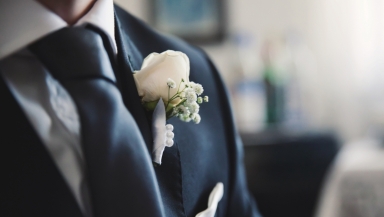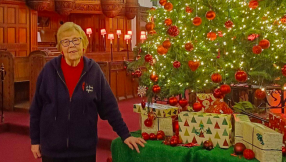
Unless you have been cut off from all news feeds for the past few weeks you will be aware of the controversy about the proposal that the House of Bishops brought to the Church of England's General Synod last month in response to the Living in Love and Faith process.
This controversy has been about prayer. The House of Bishops has proposed a set of prayers that could be used by Church of England clergy to pray for those in same-sex relationships and critics of this proposal believe that such prayers are theologically unacceptable.
In order to make sense of the issue at stake we need to understand first of all who, and what, it is right to pray for.
The answer to the question of who it is right to pray for is that we should pray for everyone without distinction. We learn this in 1 Timothy 2:1 where Paul instructs Timothy that 'supplications, prayers, intercessions, and thanksgivings be made for all men.' To quote Gordon Fee, 'Paul is urging 'that prayers of all kinds be made for everyone.'
The answer to the question of what it is right to pray for is provided by the Lord's Prayer in Matthew 6:9-13 and Luke 11:2-4, which teaches us to pray that God will give to us and to all people the ability to flourish in both body and soul as we act in obedience to his will.
This second answer sets a limit to our praying by declaring that we can only rightly pray for people to act in accordance with God's will and not otherwise. Thus, we can and should pray that people will worship, serve and obey God, but we cannot pray that people will not worship, serve or obey him.
If we apply the principle that we should pray for everyone, but that there are some things for which we may not pray, to the case of those in same-sex relationships this means, first that we should pray for them.
We should pray for them as individuals, asking that God will grant them all the things they need so that they will flourish according to his will in this world and enjoy eternity with him in the world to come. We should want this for ourselves and so we should want this for them as well.
The reason why the House of Bishops' proposals are controversial is because they potentially transgress the limits of what may rightly be prayed for. As they explain at the beginning of the draft set of prayers brought to Synod, prayers for same-sex couples:
'... are commended by the House of Bishops as resources in praying with and for two people who love one another and who wish to give thanks for and mark that love in faith before God. To celebrate in God's presence the commitment two people have made to each other is an occasion for rejoicing. The texts are offered to express thanksgiving and hope, with prayer that those who are dedicating their life together to God may grow in faith, love and service as God's blessing rests upon them.'
The reason that this proposal is controversial is that it is proposed by the bishops that such prayers could be offered to those in same-sex marriages and in other sexually active forms of same-sex relationship. This matters because the ancient Christian principle lex orandi, lex credendi (the law of praying is the law of believing), which the Church of England has always accepted, means that how the Church prays shows what it believes.
It follows that if the new liturgical materials were to be adopted by the Church of England then this would mean that the Church of England holds that same-sex sexual relationships, including same-sex marriages, are worthy of thanksgiving and celebration and may be expected to be the objects of God's blessing.
There are three difficulties with the Church of England adopting this new position.
First, what the bishops are proposing does not offer a coherent and stable end point to liturgical developments in the area of marriage and other relationships. This is because what the bishops propose logically opens the way to further developments in the Church of England's liturgical practice more radical than those currently being suggested.
The bishops are not proposing to allow same-sex marriages to take place in church, but if such marriages can be prayed for in church then there is no logical reason why this should not happen, and there will therefore be great pressure from both inside and outside the Church for it to be allowed.
Furthermore, if unmarried same-sex couples can be prayed for in church as the bishops are proposing, there seems no good reason why unmarried opposite sex couples who are in civil partnerships, or simply cohabiting, should not have their relationships prayed for as well. They can reasonably claim to be as loving and committed to each other as unmarried same-sex couples so why are they being discriminated against?
Pushing the envelope further, if marriage and sexual activity are no longer seen as restricted to couples of the opposite sex why should they be restricted to couples at all? Why not pray for those in polyamorous relationships? Indeed, how do we coherently justify any restrictions on the kinds of relationships that may be prayed for in church if the present rules are abandoned? What criteria are there for saying this kind of relationship may be prayed for while this other kind of relationship may not?
As indicated above, the only answer that makes theological sense is to say that this kind of relationship is in accordance with God's will while that kind is not, but in the bishops' brave new world how do we know which is which?
Secondly, the Church of England cannot in any case legitimately move down the path the bishops want it to take because it has not changed its doctrine with regard to marriage and sexual ethics. As the House of Bishops itself acknowledged as recently as 2019: 'the Church's teaching on sexual ethics remains unchanged. For Christians, marriage – that is the lifelong union between a man and a woman, contracted with the making of vows – remains the proper context for sexual activity.'
While this teaching remains unchanged the Church of England cannot properly adopt forms of prayer that have as their premise that marriage can be between two people of the same sex and that a sexual relationship outside marriage between a man and woman is acceptable to God and can be the subject of his blessing. Not only would this be theologically incoherent, it would also arguably be illegal in terms of Canon Law, which clearly lays down that forms of prayer can only be used if they are 'neither contrary to, nor indicative of any departure from, the doctrine of the Church of England in any essential matter' (Canon B 5.3).
If the bishops want the Church of England to embrace a liberal view of marriage and sexual ethics (whatever that might look like) they cannot do it in an underhand fashion by introducing changes in liturgy. They have to be prepared to do it in a proper manner by first seeking to officially change the Church's teaching (by for example changing the definition of marriage in Canon B.30 which describes marriage as 'a union permanent and life-long, for better for worse, till death them do part, of man and one woman, to the exclusion of all others on either side.').
Thirdly, even if the bishops were to attempt to go down this route it would not be right for the Church of England to change its teaching because what it currently teaches is also what is taught by God himself in Holy Scripture. In Scripture we learn that God ordained marriage to be between a man and a woman, and that God regards as sinful all sexual activity outside this context.
What all this means is that the bishops need to engage in a radical re-think before they bring revised proposals back to Synod in July. Yes, those in the Church of England should be praying for those in same-sex relationships, as they should be praying for everyone. However, this prayer cannot be in a form that presumes that same-sex relationships can rightly be viewed as marriages or that same-sex sexual relationships have God's approval. The basic rule is simple. That which is not in accordance with God's will cannot rightly be prayed for.
Martin Davie is a lay Anglican theologian and Associate Tutor in Doctrine at Wycliffe Hall, Oxford.













